
The Foundations were a British soul band who were primarily active between 1967 and 1970. The group's background was: West Indian, White British and Sri Lankan. Their 1967 debut single "Baby Now That I've Found You" reached number one in the UK and Canada, and number eleven in the US. Their 1968 single "Build Me Up Buttercup" reached number two in the UK and number three on the US Billboard Hot 100. The group was the first multi-racial group to have a number one hit in the UK in the 1960s.
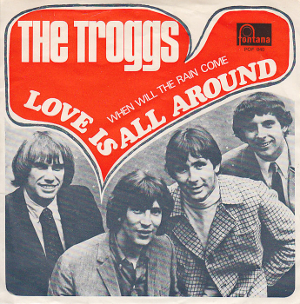
"Love Is All Around" is a song recorded by English rock band the Troggs. Released as a single in October 1967, it was a top-ten hit in both the UK and US.
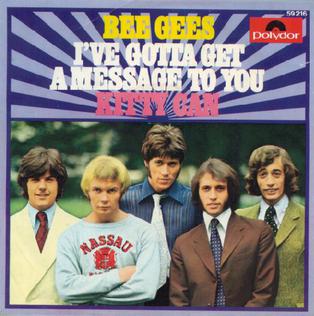
"I've Gotta Get a Message to You" is a song by the Bee Gees. Released as a single in 1968, it was their second number-one hit in the UK Singles Chart, and their first US Top 10 hit. Barry Gibb re-recorded the song with Keith Urban for his 2021 album Greenfields.

"Peek-a-Boo" is a song by English rock band Siouxsie and the Banshees. It was released in 1988 as the first single from the band's ninth studio album, Peepshow. Melody Maker described the song as "a brightly unexpected mixture of black steel and pop disturbance" and qualified its genre as "thirties hip hop". "Peek-a-Boo" was rated "Single of the Week" in both Sounds and NME. Sounds wrote that it was a "brave move", "playful and mysterious". NME described it as "Oriental marching band hip hop" with "catchy accordion." They then said : "If this nation was served by anything approaching a decent pop radio station, "Peek A Boo" would be a huge hit."

"Connected" is a song by British hip hop/electronic music group Stereo MC's. It is the title track of their third studio album, and was released in September 1992 as the album's lead single. The song samples "Let Me " by Jimmy "Bo" Horne and peaked at number 18 on the UK Singles Chart. Internationally, "Connected" peaked within the top 10 of the charts in Austria, Sweden and Switzerland, and entered the top 20 of the charts in Belgium, Finland and the United States. Its music video was directed by Matthew Amos. NME and Melody Maker ranked "Connected" number 16 and 19 in their list of "Singles of the Year" in December 1992. The song later appeared in the 1995 movie Hackers, and it was the theme to the Rob Lowe programme Dr. Vegas (2004).
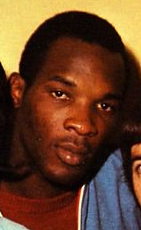
Clem Curtis was a Trinidadian British singer, who was the original lead vocalist of sixties soul group The Foundations.
The Ramong Sound was a British R&B, soul and ska band, active from 1965 to 1966.

Eric Allandale was a trombonist, songwriter, and bandleader. During the 1960s, he was in number of bands in various genres which included jazz pop and soul.

Alan Warner is an English musician who has been active from around the mid 1960s. He was a member of groups such as The Ramong Sound, The Foundations, Pluto, and The Polecats.
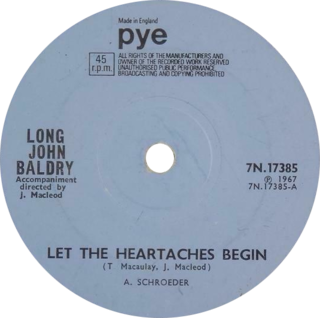
"Let the Heartaches Begin" is a song performed by British singer Long John Baldry. The single was a number one hit in the UK Singles Chart on 22 November 1967 where it stayed for two weeks. It was the second of two consecutive UK number one hits for the writing partnership of Tony Macaulay and John Macleod. The title of the B-side song is "Annabella ".
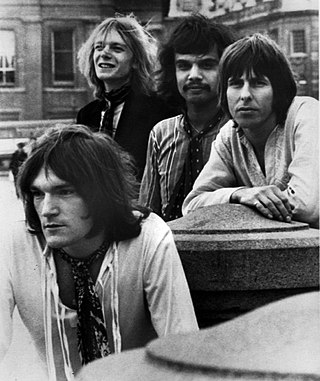
Brian Auger and the Trinity was a British band led by keyboardist Brian Auger. His duet with Julie Driscoll, the Bob Dylan/Rick Danko–penned "This Wheel's on Fire", was a number 5 hit on the 1968 UK Singles Chart.

Mike Elliott is a Jamaican-born British saxophonist. He played on ska recordings in the early 1960s and on pop and soul music hits in the late 1960s. He is best known as a co-founding member of the British band The Foundations, and played on their hit singles "Baby, Now That I've Found You" and "Build Me Up Buttercup".
"Back on My Feet Again" is the second single released by the Foundations. It was the follow-up to their hit single "Baby, Now That I've Found You". It was written by Tony Macaulay and John MacLeod and produced by Tony Macaulay. It charted at number 18 in the UK and also in Ireland. It reached No. 59 in the U.S. and number 29 in Canada.
John Macleod is a Canadian-born English songwriter and musician. he co-wrote the hits "Baby, Now That I've Found You" for The Foundations, "Let the Heartaches Begin for Long John Baldry, "Heaven Knows I'm Missing Him Now" and many more.
"Any Old Time (You're Lonely and Sad)" was the third single by the Foundations. It reached number 48 on the UK Singles Chart. It was the last single they released with Clem Curtis as their lead singer. Their next single with lead singer Colin Young would give them a bigger hit with "Build Me Up Buttercup".

"Ha! Ha! Said the Clown" is a song written by Tony Hazzard, first recorded by British pop group Manfred Mann. Hazzard claims the song "came out of the blue" though he did not demo it for weeks. Following recording a demo, he approached manager Gerry Bron, who liked it enough to want one of his groups, Manfred Mann, to record it. Manfred Mann recorded their version of the single on 10 February 1967 at Philips Studio in Marble Arch, London, together with producer Shel Talmy. It was the second of three singles Manfred Mann recorded to feature the Mellotron.
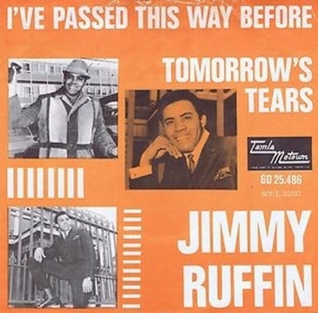
"I've Passed This Way Before" is a song by American soul singer Jimmy Ruffin, released as a single in November 1966 from his album Jimmy Ruffin Sings Top Ten. It peaked at number 17 on the Billboard Hot 100 and number 29 on the UK Singles Chart.
Clem Curtis & The Foundations were an English soul and r&b recording and performing act who were fronted by Clem Curtis. They were formed some years after The Foundations broke up. They were entrants in the 1977 UK Eurovision contest. They also had a chart hit with "On Broadway" in 1980. One of their members would later join band Hot Chocolate and another would join the soul funk band Heatwave. The group would sometimes alternate between the names, Clem Curtis & the Foundations and The Foundations.
Stoney Ground was a single for UK soul group The Foundations. It made it on to the US Billboard chart in 1972. It also represented the group's last charting first release of a single.
Sea of Faces was a 1966 single of English group The Ways and Means. Composed by Brian Parker and Kim Fowley, it became a hit for the group in early 1967.













